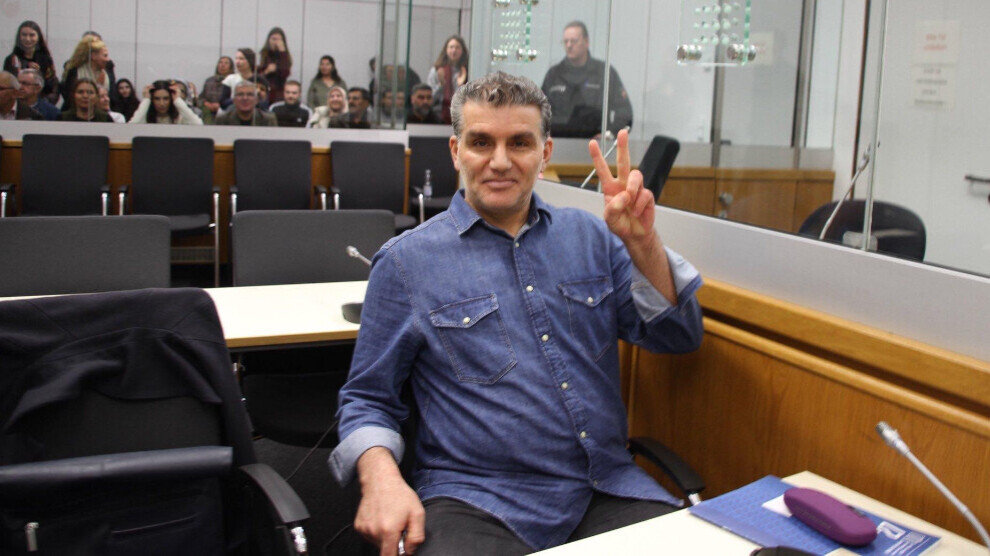Kurdish activist Mehmet Çakas sentenced to prison in Germany
Mehmet Çakas has been sentenced to two years and ten months in prison by the Higher Regional Court of Celle.
Mehmet Çakas has been sentenced to two years and ten months in prison by the Higher Regional Court of Celle.

The Higher Regional Court of Celle sentenced Kurdish activist Mehmet Çakas to two years and ten months in prison on Wednesday for membership of the Kurdistan Workers' Party (PKK). According to the Kurdish association AZADÎ, the 4th criminal division found it proven that the 44-year-old activist led the Bremen PKK region as a "full-time cadre" from 2019 to mid-2021.
The court argued that Çakas had organised and promoted meetings and events, brought people together and instructed them, collected donations and held a speech at a funeral service. Yet, he was not charged with an individual criminal offence. However, because the court was of the opinion that he had acted as a member of the PKK, it convicted him of "membership of a terrorist organisation abroad" in accordance with Sections 129a and 129b of the German Criminal Code.
Mehmet Çakas was taken into extradition custody in Milan in December 2022 at the instigation of German authorities. He was transferred to Germany at the beginning of March 2023 and initially taken to Bremen Prison. After the arrest warrant was issued, he was remanded in custody in Celle and later in Hanover Prison. The main trial began at the beginning of September last year.
The indictment also included the management of the "Hanover" area from 2018 to 2019 in addition to alleged area management activities in Bremen. This charge was dropped in the course of the proceedings. Nevertheless, in its plea a fortnight ago, the Public Prosecutor General's Office, representing the prosecution, demanded a sentence of three years and eight months in prison.
The defence lawyers of Çakas, Dr Björn Elberling and Ulrich von Klinggräff, pleaded for acquittal last week and gave detailed reasons for this as the only justifiable decision. Mehmet Çakas himself had made it clear in his final statement in court that it was not he who was on trial, but the Kurdish movement. He said he had not committed any criminal offences during the period he was accused of, but rather, he was being charged as a terrorist. This parallel to the persecution of Kurds in Turkey should give pause for thought, he added.
"With a sentence of two years and ten months in prison, the court remained well below the sentence demanded by the public prosecutor's office, but left no doubt about its will to convict and the prevailing criminalisation of the Kurdish movement," said the Kurdish association AZADÎ e.V.
"In the opinion of defence lawyer Dr Björn Elberling, the court's approach to proving the position of the person responsible for the area was particularly problematic. In order to prove the collection of donations, for example, only two text messages were interpreted in this direction, although other interpretations would have been possible. A speech at a funeral of a member of the Syrian-Kurdish PYD was just as much evidence of activity on behalf of the PKK as a statement in favour of Abdullah Öcalan. Consequently, the defence announced that it would appeal against the verdict."
Four Kurds sentenced within one month
AZADÎ further stated: "Mehmet Çakas is the fourth Kurd to be sentenced to several years in prison by a German court for membership of the PKK within a month. The prerequisite for this prosecution is an authorisation granted by the Federal Ministry of Justice and Consumer Protection in 2011, through which the German government is making itself a vicarious agent of the Erdoğan regime and helping to obstruct a solution to the so-called Kurdish question.
The results of the local elections in Turkey and northern Kurdistan a week and a half ago show once again that the people of Turkey are longing for a change in policy and that the AKP regime's time is running out despite election manipulation and violence. The German government must ask itself how long it wants to stick to its long outdated Kurdistan policy and the criminalisation of the Kurdish movement, which was doomed to failure from the outset. As the AZADÎ association, we once again demand the withdrawal of the authorisation to prosecute the PKK under Section 129b of the German Criminal Code and the immediate lifting of the ban on the PKK in order to make a just peace in Kurdistan and the democratisation of Turkey possible."